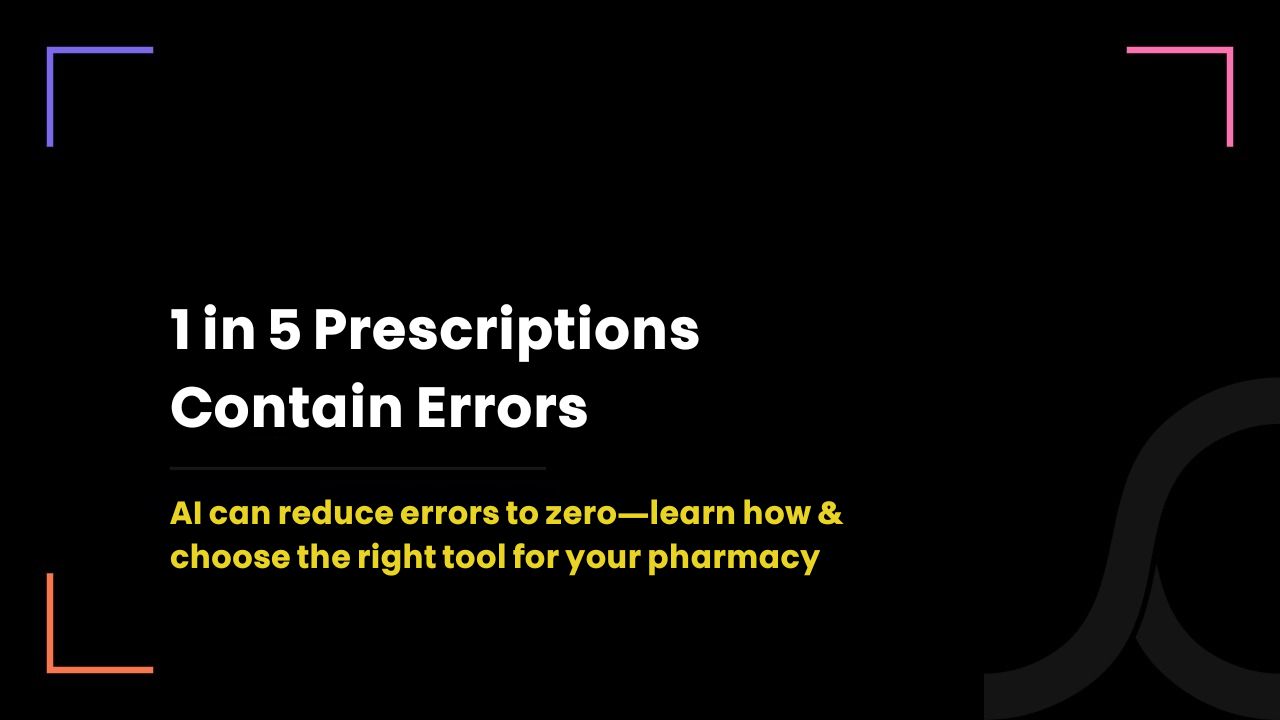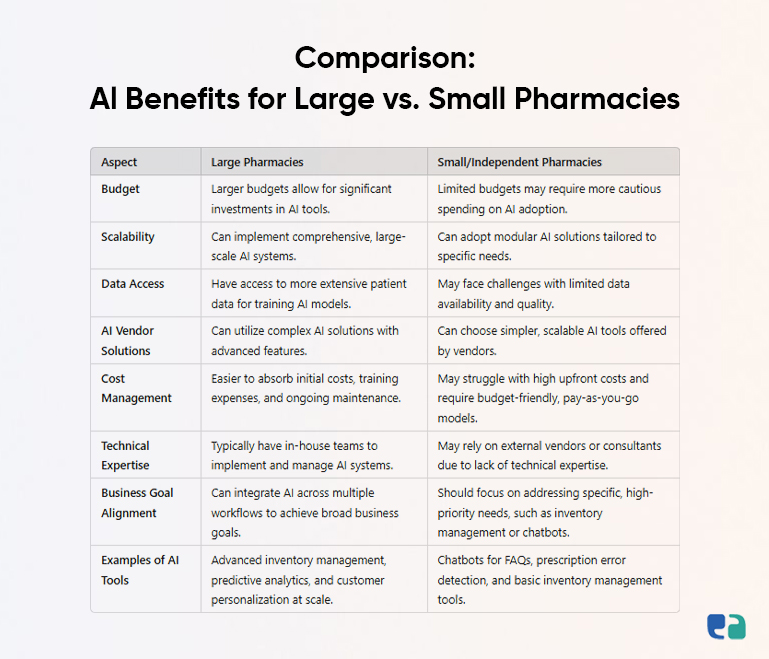How to Implement AI in Your Pharmacy Practice: A 2025 Guide

4 months ago
Pharmacy is an integral part of the healthcare system.
Their contribution to Canadian healthcare is invaluable.
But right now, all is not well.
Reason— a considerable pressure to manage complex inventory, prevent medication errors, and meet growing needs.
Pressure is not only denting profit margins but also risking patient care.
It's not just us; statistics are saying the same.
A 2023 report revealed that up to 1 in 5 prescriptions contain errors.
The time pharmacists should spend on patient care is getting wasted on routine, repetitive tasks (nearly 60%).
Pharmacists need a medical wand that reduces errors, optimizes operations, and enables pharmacists to focus on personalized care.
Well, AI is that magical band.
Yes, over 62% of healthcare organizations utilize AI to streamline workflows and improve outcomes.
With the help of AI tools, you can manage inventory & automate prescription verification.
Key Benefits of AI Tools for Pharmacies
Pharmacies are battling with inefficient workflow, and AI is giving it a tough fight. Let's see how AI is making a difference:
1. Boosting Efficiency
Most of the pharmacy operations are repetitive. AI can streamline all the routine tasks.
- Automating Medication Dispensing: AI Robotic system can package and label medications quickly and accurately, reducing errors.
- Prioritizing Workloads: AI tools analyze prescription history and usage patterns. It prioritizes the workload so that pharmacists can focus on urgent needs first.
2. Reducing Medication Errors
- Identifies potential drug interactions based on medical history.
- Detects overdose or underdose risks by analyzing electronic health records.
- Predicts adverse drug reactions, enabling pharmacists to intervene early.
3. Personalizing Patient Care
It can analyze the patient's medical history and genetic makeup to prepare a customized care plan.
Predicts medication adherence to help identify patients who may struggle to follow their prescriptions.
AI chatbots help patients 24/7 by answering queries, scheduling appointments, and giving reminders.

4. Managing Inventory Smartly
- Predicts medication demand by analyzing historical trends.
- Optimizes stocking processes, reducing overstock or shortages.
- Alerts pharmacies in case of future supply chain disruptions.
Top AI Use Cases in Pharmacies
Artificial intelligence is a game changer for pharmacy operations, making their work faster, safer, and more patient-centered. Let's explore how pharmacies are using AI today:
1. Verifying Prescriptions and Detecting Errors
Prescription errors are hazardous challenges, and AI is helping in it.
- AI tools can spot errors in dosages, drug interactions, or allergies. It can prevent serious mistakes.
- AI can flag any prescription if it needs a pharmacist's review. It saves pharmacists time.
- If there are any unusually high or low doses, it detects outlier prescriptions. It can catch potential errors.
Israeli company, MedAware, uses machine learning to analyze electronic health records. It alerts pharmacists about potential overdoses or underdoses.

2. Automating Medication Dispensing
AI tools can package and label medications accurately. It minimizes human errors.
They free up pharmacists to focus more on patient care activities, like counseling or therapy management.
Giant Eagle runs a pharmacy chain and uses an AI-driven dispensing system. Through this AI tool, the pharmacy is improving speed and accuracy.
3. Predicting Inventory Needs
Nothing can beat AI tools when it comes to optimizing resources.
They predict medication demand using historical data.
These tools have an extraordinary capability to monitor supply chains, identify disruptions early, and find alternative sources.
4. Using Chatbots for Customer Support
It is one of the patients' favorite AI tools. It can answer frequently asked questions about medications or insurance 24/7.
It helps in scheduling appointments for vaccines or consultations. It can also forward complex inquiries to pharmacists for expert advice.
- Sends medication reminders
- Improves adherence & health outcomes
Cost and ROI: Is AI Worth It for Pharmacies?
It's undoubtedly a big decision to invest in pharmacy. It comes with upfront costs, but returns are impressive, bringing more profit to your pharmacy. Let's see how it can:
The Costs
1. Initial Investment
To implement AI in your pharmacy system, you must spend on software and hardware and integrate them with your current systems.
2. Training the Team
AI is new, so your staff will need initial training to use it optimally. Your health-tech partner can provide such training.
3. Maintenance and Updates
AI systems need regular updates and maintenance.
The Potential Returns
ROI depends on various factors. It takes a lot of work to get the exact number. Explore how AI can bring value in these critical areas:
1. Boosting Efficiency
Automating repetitive tasks like prescription processing and inventory management, AI can save pharmacists time that they can spend focusing on patients.
2. Reducing Errors
AI tools reduce medication errors. It not only ensures patient safety but also lowers the costs of hospital readmissions.
3. Advancing Drug Development
AI analyzes massive datasets to find new drug candidates faster. By accelerating drug development, it can reduce the medication cost for everyone.
To get an accurate idea about cost and ROI, consult our health tech experts—it's free!

Navigating Data Privacy and Security in AI-Powered Pharmacies
AI's benefits to pharmacy are huge, but it also raises security and privacy concerns.
Key Regulations to Know
For Canadian pharmacies, compliance with PIPEDA is a must. They must limit data collection, safeguard information, and allow patients to access their data.
In the USA, pharmacies have to protect patient data under HIPAA. Follow the rule to avoid paying hefty fines for your pharmacy.
Each state may have unique rules. Pharmacies need to stay updated and follow these alongside federal guidelines.
Meet Canada’s compliance experts who understand local regulations and can help you navigate them effortlessly.
Protecting Patient Data in Practice
- Encryption during the transfer and storage of data.
- Access to only authorized staff.
- De-identification.
- Regular audits for uninterrupted service.
- Vendor selection is based on who meets strict privacy standards.
Taking Responsibility
AI is fantastic, but it can't replace human oversight.
Pharmacists must train staff to use AI tools wisely and let them know their limits. You have to keep a close eye on AI-driven processes to catch errors.

Selecting the Right AI Solution for Your Pharmacy
Choosing the AI solution for your pharmacy is a crucial process. The success of an AI system depends on it. Let's explore some of the critical factors you should consider while selecting AI solutions:
What to Look for in an AI Vendor
1. Pharmacy Expertise
Pick health tech experts who understand pharmacy workflow & healthcare regulations like HIPAA or PIPEDA.
2. Data Security
Ensure the IT team you want to collaborate with offers strong encryption, access controls & compliance certifications.
3. Scalability
Opt for solutions that can grow with your pharmacy and allow gradual implementation.
4. Integration
Choose the tool that smoothly integrates with your existing system.
5. Support and Training
Choose a vendor who can provide fast customer support and staff training.
6. Transparent Costs
Request a detailed cost breakdown, including setup, licensing, and maintenance fees.
Meet health tech experts who can help you choose the best AI tools that fit your pharmacy's needs.
Ready-Made vs. Custom-Built AI Solutions
Ready-made solutions are quicker to set up and lower initial costs. But they have limited customization.
If you're running a large pharmacy chain, we advise you to go with custom-built solutions, as they are built to meet the complex needs of your pharmacy and grow with your requirements.
Custom solutions have slightly higher costs and longer development time but are fully tailored to your pharmacy's operations.
Success Stories of AI in Pharmacy: Real-Life Examples
Some inspiring success stories showcase how pharmacies use AI to enhance services and patient care.
1. Walgreens & Medline Partnership
Recently, Walgreens introduced a video chat platform for patients to connect with healthcare professionals.
Shows how AI can boost telehealth and patient engagement.
2. UCSF Robotic Pharmacy
Automation is not new. Some giant pharmacies, such as UCSF Pharmacy, are leveraging it from the old times.
They launched a robotic system to automate medication dispensing.

3. Giant Eagle's Dispensing System
This pharmacy chain uses AI to automate medication packaging and labeling.
They complete high-volume dispensing with the utmost accuracy and efficiency.
4. Medication Advisor by MedAdvisor Solutions
This AI tool personalizes conversations with patients about their medication.
It helps in answering complex health queries 24/7.
5. AI-Based Internet Hospital Pharmacy in Shanghai
During COVID-19, this hospital introduced AI to review prescriptions, generate pick-up codes, and manage self-pick-up machines. It ensured uninterrupted medication access during the pandemic.
Lessons Learned
1. Set Clear Goals: Ensure your pharmacy's objective, like improving medication adherence or streamlining dispensing.
2. Data is Key: Ensure you have organized, clean, and sufficient data to train your AI tools.
3. Collaboration Matters: Select a healthcare-specific IT team that understands in & out of pharmacy and healthcare compliances in depth.
4. Trust and Transparency: You need to understand how AI makes decisions. Trust grows when systems are explainable and fair.
5. Monitor and Improve: AI isn't a one-time setup. It would help if you had regular monitoring and updates so that the AI system remains aligned with pharmacy needs.

